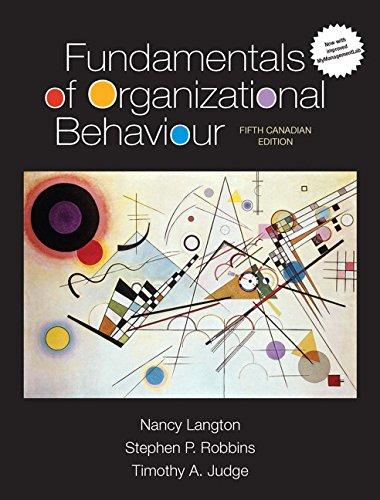As the father of two young children, Marshall Rogers thought that serving on the board of Marysville
Question:
As the father of two young children, Marshall Rogers thought that serving on the board of Marysville Daycare would be a good way to stay in touch with those who cared for his children during the day. 61 But he never dreamed that he would become involved in union-management negotiations with daycarecentre employees.
Late one Sunday evening, in his ninth month as president of the daycare centre, Rogers received a phone call from Grace Ng, a union representative of the Provincial Government Employees' Union (PGEU). Ng informed Rogers that the daycare employees would be unionized the following week. Rogers was stunned to hear this news. Early the next morning, he had to present his new marketing plan to senior management at Techtronix Industries, where he was vice-president of marketing. Somehow he made it through the meeting, wondering why he had not been aware of the employees' unhappiness, and how this action would affect his children.
Following his presentation, Rogers received documentation from the Labour Relations Board indicating that the daycare employees had been working to unionize themselves for more than a year. Rogers immediately contacted Xavier Breslin, the board's vice-president, and together they determined that no one on the board had been aware that the daycare employees were unhappy, let alone prepared to join a union.
Hoping that there was some sort of misunderstanding, Rogers called Emma Reynaud, the Marysville supervisor. Reynaud attended most board meetings, but had never mentioned the union-organizing drive. Yet Reynaud now told Rogers that she had actively encouraged the other daycare employees to consider joining the PGEU because the board had not been interested in the employees' concerns, had not increased their wages sufficiently over the past two years, and had not maintained communication channels between the board and the employees.
All of the board members had full-time jobs elsewhere, and many were upper- and middle-level managers in their own companies. They were used to dealing with unhappy employees in their own workplaces, although none had experienced a union-organizing drive. Like Rogers, they had chosen to serve on the board of Marysville to stay informed about the day-to-day events of the center. They had not really thought of themselves as the center’s employer, although, as board members, they represented all the parents of children enrolled at Marysville. Their main tasks on the daycare-center board had been setting fees for the children and wages for the daycare employees. The board members usually saw the staff members several times a week, when they picked up their children, yet the unhappiness represented by the union-organizing drive was surprising to all of them. When they met at an emergency board meeting that evening, they tried to evaluate what had gone wrong at Marysville.
1. If you were either a board member or a parent, how would you know that the employees taking care of your children were unhappy with their jobs?
2. What might you do if you learned about their unhappiness?
3. What might Rogers have done differently as president of the board?
4. In what ways does this case illustrate that knowledge of OB can be applied beyond your own workplace?
Step by Step Answer:

Fundamentals Of Organizational Behaviour
ISBN: 9780134204932
5th Canadian Edition
Authors: Nancy Langton, Stephen Robbins, Timothy Judge





